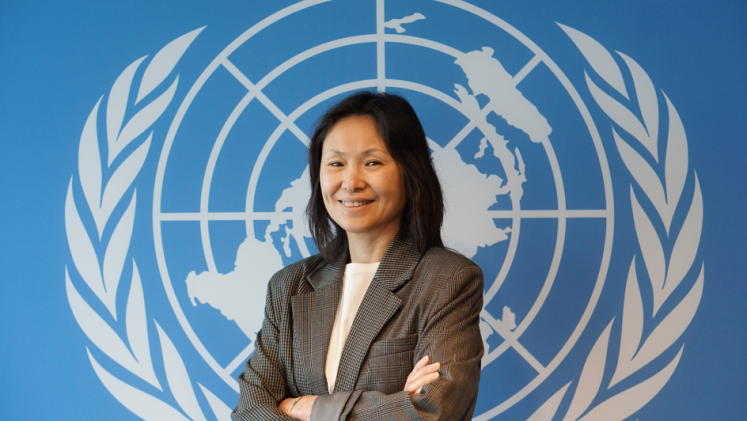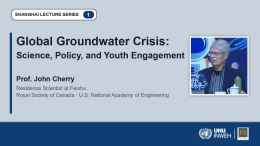When did you join UNU-EHS, and what was it like when you started?
I joined UNU-EHS in August 2020, which was in the middle of the COVID pandemic. I had worked with EHS before, in its early years, so I knew the institute back then as a group of very passionate people doing really meaningful research. I expected the team to be bigger, but to do the same meaningful research and with the same passion.
When I first joined, it was altogether a very challenging time because I did not even have the chance to meet my own team. Everything was done via videoconference, and we had to manage the situation with COVID itself, too. There was a lot of uncertainty, and well-being was a major concern for me. Luckily the entire management team was very much on the same page as I was, so we made every effort to manage this difficult time. I did feel that there was a very strong team spirit, which was very caring — both in the sense of caring about other people in the institute as well as really caring about what we do. I think these are two things which were so important for me, for any institution really, to be caring for both its people and the content it works on. So basically, I found a bunch of idealists.
What was your vision when you first joined?
When I first joined as director, I took some time to learn about how things were then. I finally decided to focus on three priority areas: increase visibility and impact for the institute, address funding challenges and instill new thinking. I wanted it to be a healthy and organic evolution, I did not want to start a revolution. One of the first things I did was that we together, collectively started what has become the institute’s flagship report, which has been a game changer from the very beginning. It has been a change to how we are perceived, and we are now much stronger as a leading think tank due to that, because if you receive media coverage, people will get to know you. Ninety-one per cent of papers on climate change research published in 2020 did not make into the media. And of the 9 per cent that did, only a small fraction of those were about non-natural science research and research on potential solutions. So, the fact that we made it with our interdisciplinary report is an indicator that we have gained momentum and achieved big visibility, especially with our solution packages.
How would you describe the culture at the institute?
That is another thing I am quite happy about. I think UNU-EHS has a very open culture. It is a safe space for people to think and conduct research. At the same time, it is also a safe place to express whatever they think about the institute to their supervisors and to myself. There is a very open spirit about it, very collaborative, and we value cooperation over competition.
What are you most proud of from your time at UNU-EHS so far?
My team.
What has been your greatest challenge since joining?
I think for a good institution, you need a couple of things. The first thing is to have excellent people who are dedicated and passionate about what they do. And second, you need to have enough resources to support these people, be it to pay their salaries or be it to support the activities they want to do. You need to provide them a sense of stability, financially. The third thing which is important is to have a culture of openness and safety.
I very quickly realized we already have excellent people, and they have passion. What was largely missing was really the financial stability. We are very successful at obtaining third-party funding, but that has also become a challenge for us because we were lacking the support in core funding to be able to allow more flourishing, more agenda-setting and more stability. I think the core funding was the biggest challenge that we have been facing and that I have been facing as a director, but luckily we were able to receive a significant funding increase from BMBF, one of our core donors.
What were some of the biggest highlights for you so far?
One of the biggest highlights was really the publication of our flagship report series Interconnected Disaster Risks, because that has generated so much media attention, reaching more than 1,000 media outlets for the first edition and even more in later editions. That has also given the entire staff body the confidence that we are doing something really significant and important that is receiving external recognition. But there are also many highlights that may seem to be small, but that are actually big for me, too. Whenever I speak to one of our team members, when I feel the passion of this person for the work, that is also a highlight for me. There is a can-do attitude and a spirit of support. Whenever there is difficulty, there are always people who jump in and support. So, when I experience this in my daily life, that's a highlight for me.
How would you like to see UNU-EHS develop in the future, both in the near future and long term?
I think about that a lot. I have been here for almost four years, so I am finishing my first term. I am starting my second term in August. In my first term, I wanted to work on visibility, fundraising and creating an institutional culture which provides people a safe space – which goes also hand-in-hand with improving working conditions, and then the new thinking I mentioned before. We worked really hard on all this with the management team.
So now I'm coming to my second term. What I have in mind for my second term is to focus on truly equal partnerships with the Global South. We really need to unwrap a lot of the topics surrounding colonization, decolonization, how to change some of the structures to allow more equal partnership, to leverage knowledge and experience from the Global South in their own countries and to provide real service. In addition, I want to take a closer look at impact, what kind of impact we are creating and how we can create that kind of impact by truly benefiting the people we should be serving.
One wish I have for UNU-EHS is that we can find more room to define our own research agenda. If we truly want to get ahead of the curve, we need to think about things which no one has ever thought about. But if nobody has thought about it before, that means there is usually also no funding agency for it yet. If we want to be truly cutting-edge, we will do research that makes people feel uncomfortable or challenges the current thinking. That is critical for a think tank, but to do these kinds of things, which are very important for any society, you need your own funding.
If you came back to visit UNU-EHS in another 20 years, what would you hope to find?
I would love to find the same lovely people. Or maybe new people, but with the same spirit. To see them trying different things, to see them really being creative, different and brave, that is what I would like to see.



